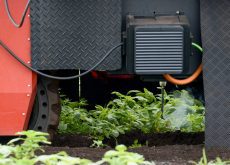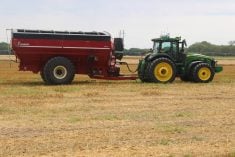The president of Parkland Industrial Hemp Growers advises western Canadian hemp producers to hold out for the best price before signing a contract in 2011.
“With $600 canola and $350 wheat, you should be pricing your hemp, non-organic commercial hemp, at 90 cents per pound, said Chris Dzisiak, a grower from Dauphin, Man.
“If you’re not, you’re giving it away.” Most growers contracted conventional hemp seed for 65 cents an acre last year.
However, prices are now increasing.
“We are signing contracts at 90 cents per lb. At this point we have three buyers that have agreed to that 90 cents per lb. price.
Read Also

Powdery mildew can be combine fire risk
Dust from powdery mildew can cause fires in combines.
Dzisiak expects members of Parkland Industrial Hemp Growers to grow 3,000 to 4,000 acres of hemp this year.
Keith Watson, a diversification specialist with Manitoba Agriculture, said the recent price increases signal that processors are chasing the 20,000 to 25,000 acres needed to sustain the Canadian industry.
“Maybe even 30,000 acres. Where that’s going to come from is a good question. With the price of canola, it is going to have to compete.”
Complicating matters last year were poor growing conditions for most hemp growers. The crop doesn’t tolerate prolonged wet soil conditions and many hemp crops were either ruined or produced poor yields.
Watson said expected flooding for parts of Manitoba this spring may prompt producers to grow a less risky crop, such as canola.
Anndrea Hermann, sales account manager with Hemp Oil Canada in Winnipeg, said the company is getting acres under contract despite concerns over price and a potentially wet growing season.
“We do have a core group of growers that are coming back to us,” she said. “We’re well on track to secure the acreage that we need.”
However, she said processors will need more acres of conventional hemp grain this year.
“Because we had such a bad cropping year (in 2010), we’re already on low supply of conventional grain…. That’s speaking from the perspective of the industry,” Hermann said.
“So we’re going to need more conventional acres because probably by the time harvest comes around, we will be completely out of conventional grain.”
Consumer demand for conventional hemp seed is also increasing.
Dzisiak said producers want to grow hemp and want processors to succeed, but they should be compensated according to market realities.
“If they are paying competitive prices… they’ll have product.”
Watson said it’s hard to know how many acres hemp producers will seed this spring, but he expects many will put off the decision as long as possible.
Manitoba hemp industry:
• Producers seeded 4,299 acres in 2009 and 9,249 in 2010
• Three major hemp seed processors operate in Manitoba – Harvest of Winnipeg, which says it is the largest vertically integrated hemp company in the world, Hemp Oil Canada of Ste. Agathe, Man., and Farm Genesis Group of Waskada, Man.
• Robert Jin, a Chinese entrepreneur, owns Plains Industrial Hemp Processing and plans to build a hemp fibre plant in Gilbert Plains, Man.

















